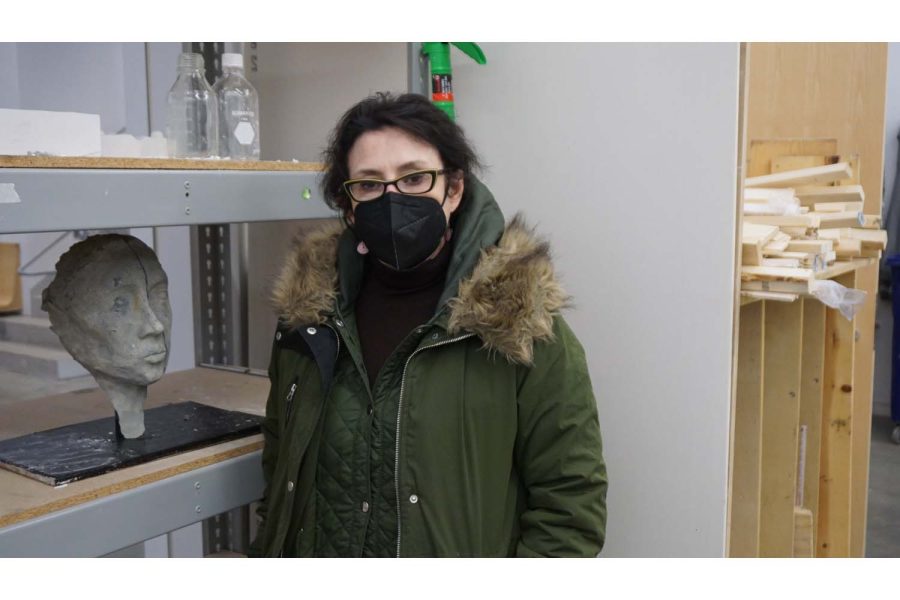DEI initiatives to increase underrepresented UI student success in the arts
The University of Iowa College of Liberal Arts and Sciences grant funds arts initiatives aimed to increase diversity and opportunities for success for underrepresented students.
Director of the School of Art and Art History DEI Committee, Isabel Barbuzza, poses for a portrait on Wednesday, Jan. 27, 2022.
January 27, 2022
To continue community dialogue on diversity and increase underrepresented student success in the arts, the University of Iowa School of Art and Art History is launching two major initiatives funded by a UI College of Liberal Arts and Sciences 2021 grant of about $100,000.
These initiatives include hiring a person of color as an interdisciplinary visiting artist and scholar program in collaboration with the Stanley Museum of Art, Iowa Writers Workshop, Obermann Center for Advanced Studies, the UI Center for the Book, as well as other community organizations.
Amy Huang, UI assistant professor and member of the UI School of Art and Art History Diversity, Equity, and Inclusion committee, said this program will bring new perspectives, start conversations, and spark new possibilities in underrepresented students who may identify with the visiting artists and scholars.
“I think that kind of exposure is beneficial through our visitors program, not just for BIPOC students but also for a student from the majority community to expose them to a greater variety of scholarship, art practices, and scholars and artists from more diverse backgrounds,” Huang said.
Isabel Barbuzza, UI professor and director of the UI School of Art and Art History Diversity, Equity, and Inclusion Committee, said the visitors program will likely start conversations and participation not only throughout the university, but in the community as well.
“It’s gonna have an impact, not only on the School of Art and Art History, but I think for the museum, for the community, for the university at large,” Barbuzza said. “Because bringing important people, people who have a trajectory of success and who make art is compelling.”
Lauren Lessing, director of the UI Stanley Museum of Art, said the programs that the museum has to further DEI in art complement the plans of the School of Art and Art History. Lessing said the collaboration and grant will help address diversity disparities in the museum field.
“The issues that were called out in this grant, about the fact that art programs in this country don’t reflect the population of this country, the same thing is true in museums. Staff of museums are way too white,” Lessing said. “So we have a lot of work to do in interesting potential students while they’re still students in thinking about the museum field as a potential profession.”
Cory Gundlach, curator of African Arts at the Stanley Museum of Art, said bringing in artists of color to engage with students of color is cutting edge in terms of how the museum is practicing social justice.
“There’s definitely new directions in terms of the degree to which we are incorporating social justice into our programming,” Gundlach said. “Historically there was a focus on interdisciplinary collaboration and we’re taking that further by framing it in terms of social justice, which I think is the unprecedented factor to consider.”
The second major initiative funded by this grant is the Arts Summer Residency and Mentorship Program that will host post-bachelor’s or bachelor of fine arts students of color and LGBTQ+ students interested in pursuing a master’s of fine arts or doctorate degree in the visual arts, art history and museum curatorial practices.
The summer residency program was modeled after the Summer Research Opportunities Program, according to the grant’s proposal to the College of Liberal Arts and Sciences Strategic Initiative.
Because of the pandemic, the summer residency program has been moved to 2023 and will be bringing in twelve recent graduates in the visual arts from across the nation who will stay on campus for four weeks, attend workshops, work one-on-one with teacher’s assistants and faculty, and engage in other methods to prepare for graduate study.
Huang said the summer residency program is working to address a “pipeline issue” created due to students from underprivileged backgrounds facing barriers when attending college and grad school.
“If you don’t get people to get into college and get into grad school, they’re less likely to eventually end up in leadership positions,” Huang said.



